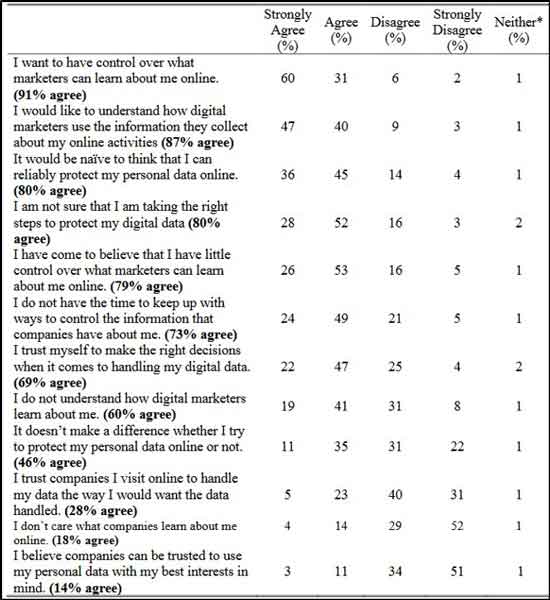Welcome back. Residing on my wife’s family farm in my retired state, I normally go unseen by anyone other than Vicki except for Friday mornings at the supermarket. Nevertheless, a few weeks ago, I decided that, seen or unseen, I really needed a new pair of jeans.
The next Friday morning, I visited the store where I bought the jeans, only to learn they no longer carried jeans by that manufacturer. The manufacturer’s website confirmed comparable jeans were still available, and I checked prices at a few online sites. Two days later, multiple advertisements of the jeans started appearing in my newsfeeds.
Hmm…how did they know? Did I agree to something simply by searching?
Researchers affiliated with the Annenberg School for Communication at the University of Pennsylvania in collaboration with researchers with New Hampshire and Northeastern universities gave me the answer.
Consent has always been a central part of Americans’ interactions with the commercial internet…Genuine opt out and opt in consent requires that people have knowledge about commercial data-extraction practices as well as a belief they can do something about them…the latest Annenberg national survey finds that Americans have neither.
 |
| Online personal data of value to marketers (from www.ibj.com/articles/under-surveillance). |
The survey, conducted in August and September 2022 by NORC, set out to determine if current online “informed consent” practices are working. NORC queried 2,014 nationally representative adult internet users in the U.S. from its AmeriSpeak Panel.
To gauge internet navigational knowledge, the principal part of the survey asked 17 true-false questions about online marketing practices. Of the 2,014 surveyed, 77% had 0-53% correct, 15% had 59-65% correct, 6% had 71-76% correct, 1% had 82-88% correct, and one person had 94% correct.
 |
| True-False statements and responses about basic corporate and governmental internet practices and policies; DK – don’t know; bolded numbers indicate correct answers (Table 2 from www.asc.upenn.edu/sites/default/files/2023-02/Americans_Can%27t_Consent.pdf). |
Another key part of the survey
posed 12 statements to plumb people’s perception of their data control
and company trust. Nearly all Americans want control over what marketers
can learn about them online (91%) or at least want to understand how
marketers are using their data (87%). Most are unsure they are taking
the right steps to protect their digital data (80%), and they believe
they have little control over what marketers can learn about them online
(79%).
As for trust, only 28% of Americans agree that they
trust companies they visit online to handle their data in ways they
would want. Even fewer (14%) trust companies to use their data with
their best interest in mind.
 |
| Responses to statements about control over their personal data; “Neither” was volunteered, don’t know, or skipped (Table 4 from www.asc.upenn.edu/sites/default/files/2023-02/Americans_Can%27t_Consent.pdf). |
Among Other Survey Findings
-
Americans lack trust in “data tradeoffs,” where marketers offer value
(e.g., discounts, improved service, use of a store’s wireless internet)
in exchange for personal data.
- Many are willing to give up their
data simply because they feel resigned or powerless to stop marketers
from imbibing data about them.
- Most feel that what companies know
about them from their online behavior can hurt them, and they are
resigned to that happening.
- Fully 79% of Americans said it is urgent for Congress to regulate how digital companies use personal information.
Wrap Up
The
great majority of those surveyed don’t understand the fundamentals of
internet marketing practices and policies, don’t understand what
marketers are learning about them online, don’t want their data
collected, feel powerless to stop it, and feel incapable of consenting
to how companies use their data.
As a result, the researchers conclude that Americans cannot truly give informed consent to online data collection.
I suspect you might have some thoughts on this. Thanks for stopping by.
P.S.
Annenberg survey report: www.asc.upenn.edu/sites/default/files/2023-02/Americans_Can%27t_Consent.pdf
Article on study on EurekAlert! website: www.eurekalert.org/news-releases/978952
NORC: www.norc.org/About/Pages/default.aspx

No comments:
Post a Comment